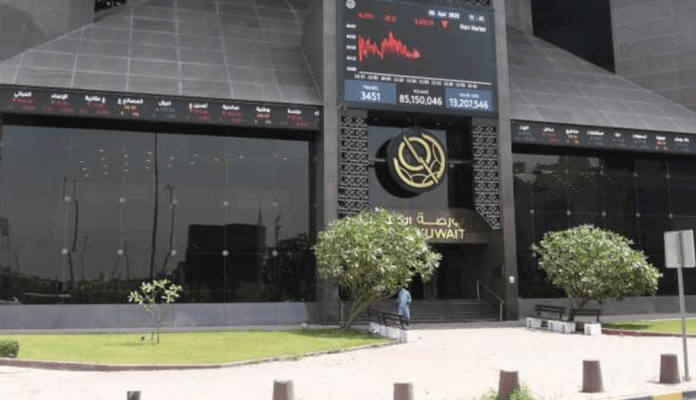In light of a number of external and local indicators and influences, the Kuwait Stock Exchange witnessed a noticeable decline in the level of liquidity in circulation, dropping by 32% to 41.4 million dinars since the beginning of this year, compared to 61.7 million last year, which is the lowest average liquidity during the last four years, during the many crises, on top of which was the Corona crisis.
This sharp decline in the average daily traded liquidity was accompanied by a 50% decrease in terms of the volume of trades, which fell from 264 million shares last year to 134 million since the beginning of 2023, while the number of deals decreased by 30% from 12.4 to 8.6 thousand deals, reports Al-Qabas daily.
The statistics and numbers show a state of weak trading in the market and the leading stocks, most of which have abandoned price peaks downwards, despite achieving good growth rates in profits in 2022 and the first quarter of 2023, as well as the approval of generous distributions by their general assemblies. The following are the reasons for this decline:
Successive global crises — the successive crises caused a state of uncertainty in the markets, the latest of which was the successive collapse of the third US bank in two months (First Republic Bank), and renewed fears that a credit crisis is taking shape, and the crisis facing central banks, which occurred between inflation bonds and fears of falling in the clutches of recession, which makes its continuation of increasing interest rates dangerous and not increasing them more dangerous, and therefore the Kuwaiti Central Bank and the Kuwait Stock Exchange are not isolated from the repercussions of those crushing economic conditions.
An increase in interest rates — in light of concerns about the repercussions of increasing the discount rate by the Central Bank of Kuwait to the level of 4%, compared to 1.5% at the beginning of the Corona crisis, the credit growth rate was subjected to a significant decline with the end of the era of cheap loans, and the wheel of zero loans stopped, as the credit growth rate declined to 0.5% in the first two months of 2023, compared to 1.1% in the same period last year.
In light of the fears and uncertainty, large and small investors resorted to hedging, and searched for guaranteed investment channels until the picture became clearer, which was provided by bank deposits, especially in Kuwait, where interest is high and deposits are guaranteed by the government.
Absence of other tools and non-activation — despite the success of Boursa Kuwait, in cooperation with the Capital Markets Authority, in approving many investment products and tools, including income-generating real estate funds, priority rights, selling on the market maker, shorting (lending and borrowing shares), swap deals, and transfer of ownership, in addition to agreed upon deals, investment funds, margins, and netting service, the market still lacks more tools, while many tools remained inactive or are used on a limited scale by investment companies, either for reasons belonging to investment companies.
The investment itself or for regulatory reasons makes the use of these tools by companies not economically feasible, which requires more efforts to make these tools more feasible.
Withdrawing and delisting companies — over the past years, the Kuwait Stock Exchange witnessed the withdrawal of companies and the delisting and cancellation of many companies, the number of which exceeded 60, and while the decision to withdraw is purely for its owners and shareholders, the search for the reasons for withdrawal and an attempt to avoid them is a duty.
Its repercussions may be great for the holders of those shares and the market itself, especially since these shares have long been described as popular and cheap, which will fall on small traders and speculators.
Double qualitative new listings — despite the strenuous efforts made by Boursa Kuwait to attract family and oil companies to be listed on the stock exchange, which entails huge gains for the national economy, market and citizens, these efforts still collide with government stagnation on the one hand, and the political environment on the other hand, while more listings remain.
Family businesses depend on providing the appropriate regulatory environment in the market, the local economic conditions, and the price value of the shares, which guarantees a fair evaluation of them on the other hand.
Ownership of government institutions — the ownership of institutions and government agencies on the Kuwait Stock Exchange has doubled during the last 5 years, to reach 6.75 billion dinars by the end of 2022, in conjunction with the significant rises in the prices of shares listed on the stock exchange, but in light of the crises and the state of uncertainty experienced by economies and global markets, it has become more beneficial for these institutions Increasing its investments in Boursa Kuwait in selected stocks with guaranteed returns.
Investment environment — with the opening of investment prospects in the stock exchange for foreign investors to own Kuwaiti stocks, including banks, and the inclusion of the market in global indices, the ownership of foreigners in banks increased to about 5.4 billion dinars, but this does not negate that the political and economic atmosphere in Kuwait is no longer very attractive to the local investor before foreign.
Traders are conservative — in light of the murky atmosphere of the markets, the institutional investor is often reserved and the small ones refrain from taking risks, including investing in stocks, which appears in the form of a decline in 16,000 active accounts on the Kuwait Stock Exchange, compared to about 401,000 passive accounts.

















